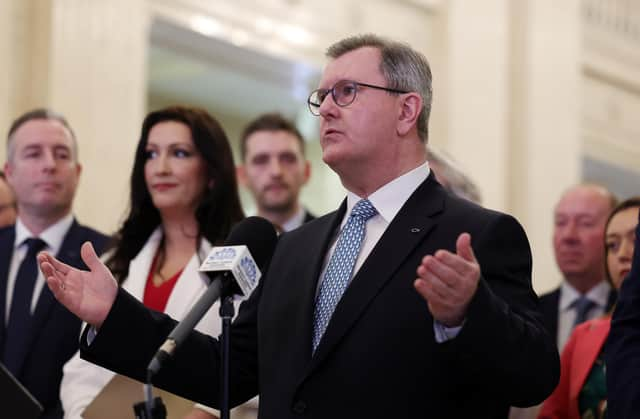Ben Lowry: The DUP decision not to take one of the key available Stormont posts was a surprise


But the last week was striking for another reason, that has attracted much less attention – and one which happened with the acquiescence of the DUP.
Sinn Fein not only took the first minister’s position, it took arguably the two most important ministries thereafter – those of the Department of Finance, which will go to Conor Murphy, and the Department for the Economy, which goes to Caoimhe Archibald.
Advertisement
Hide AdAdvertisement
Hide AdFurthermore, the Department for Infrastructure portfolio has gone to another Sinn Fein politician, John O’Dowd, and the party has chairmanship of the Stormont committee that will scrutinise the Windsor Framework – a post which goes to Declan Kearny.
The republican party’s political power will therefore be immense over the course of this assembly.
When it emerged that the DUP had let SF take both finance and economy, I was on the steps just outside Stormont talking to politicians and an experienced Ulster Unionist MLA emerged to say that he thought there had been a mistake in the DUP choices. The departments of finance and economy are expected to be among the first two to be taken, and expected are divided between the two main parties, and thus split across the tribal divide, for the simple reason that they are so important, and have such sway over monetary and economic policy and stewardship. Neither of the big two parties wanted the other to have control over both finance and economy.
I say ‘expected to be’ divided that way rather than ‘typically was divided’ because it is hard to make comparisons with the past – the original power-sharing assembly after 1998 and the first one after it was restored in 2007 both had a larger number of overall departments, with various responsibilities that were later merged and simplified. But after the 2016 election, Sinn Fein had finance (Máirtín Ó Muilleoir) and the DUP had the economy ministry (Simon Hamilton), while in 2020, after the restoration following the three-year SF collapse of the institutions, SF kept finance (under Conor Murphy) and the DUP held economy (under Diane Dodds).
Advertisement
Hide AdAdvertisement
Hide AdNow that division has gone. The DUP has instead chosen education (Paul Givan) and the Department for Communities (Gordon Lyons). Why did the DUP do this? The DUP now has only three ministers, while Sinn Fein has four. In the more recent of past MLA elections, the DUP was the largest party. Now it has lost that mantle to SF. Thus the DUP has one fewer choice of ministry.
The DUP thinks that the finance or economy ministers cannot sign off on major decisions without the approval of the first and deputy first minister and so there is a brake on what Sinn Fein can do in those two departments. Even so those ministries have massive sway.
That SF’s first choice was economy reflects their desire to push the all-island economy. Mr Murphy has already met Simon Coveney, one of the greenest Irish ministers of recent decades and one who has not been shy about making known his nationalist views on Northern Ireland, for example telling us in the long Stormont hiatus that we must agree the republican demand of an Irish language act.
Economy will now be run by a minister, Mr Murphy, who has long experience of Stormont – previously at Regional Development (akin to infrastructure) then in the vital role of finance. He will know how best to use the levers of power advance his party’s agenda.
Advertisement
Hide AdAdvertisement
Hide AdThe DUP seems also to think that finance and economy might be a poisoned chalice for Sinn Fein. The party will have to implement some of the cuts and reforms it so abhors.
Its choice of departments also seems to signal a shift to battling on cultural matters. It will now have say over the controversial matter of Relationship and Sexuality Education (RSE), over the future of grammar schools, over the allocation of community funds and the contested new stadium at Casement.
As a believer in academic selection I would have been concerned to see that department fall to Sinn Fein, as it did before. But I am surprised that the DUP has not taken one of the bigger departments. Infrastructure has a lot of clout too (although clout is not the only factor for parties – Health has clout but the other parties are happy to leave its huge challenges to the UUP, which in turn is happy to raise its profile by taking the ministry, problems and all)
I remember being at the election count in Belfast the night in 2016 Brexit was endorsed by UK voters. Sammy Wilson, a former finance minister, was among the DUP politicians present cheering.
Advertisement
Hide AdAdvertisement
Hide AdAlso there was Declan Kearney of Sinn Fein, a former junior minister. He held his counsel that night and betrayed no personal emotion. I wonder if he knew how well that momentous decision to quit the EU would bolster Irish republicanism. Now he will be a key scrutinising vote over the Irish Sea border.